Student Blog
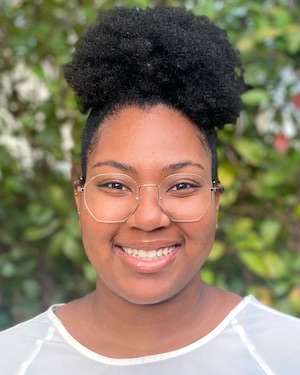
When In Doubt, OT it Out! ⟩
January 13, 2022, by Kayla
The holidays were amazing, not only because I got to travel back home to California, spend lots of time with my family, and see some of my friends. But also because it came with a much needed break. A break from classes, assignments, presentations and from residency. As amazing as this journey is, sometimes the load does get heavy. This past Monday, the spring semester started and I was admittedly feeling less than inspired logging into my first zoom class of 2022. As an occupational therapist, constantly surrounded by other occupational therapists, sometimes a light bulb goes off to practice what I preach. I call it “OT’ing myself.” While settling back into my typical workflow I’ve decided to focus on engaging in some of my most meaningful occupations to fill my cup and replenish my energy so I can be the best version of myself. This week I’ve been more intentional with:
Listening to Music:
My days have been filled with music and singing and dancing (badly) around my house after work. I play my favorite playlist when I wake up in the morning, look for new songs in my free time, and play my go-to feel good songs when I’m sitting in traffic.
Exercising:
As an ex-college athlete, I have recently found myself missing my playing days a lot more than usual. And although I can’t go to the gym and play pick-up games because of covid, I have been more diligent with getting some form of exercise everyday. Taking online cycling classes with my favorite instructor and a few friends has been helping to keep me in the right mindset!
Cooking:
I absolutely LOVE cooking, and I love trying to make new recipes even more-so. This week I searched my saved videos on TikTok to find those recipes that I saved and forgot about . . . and actually made one! It was delicious, if I do say so myself, and exactly what I needed.
I’m also starting to write down all of my favorite recipes to make and making my own personal cookbook. So stay tuned for that in a book store near you. 😉
Sleeping:
New year, same me. Like I may have mentioned before, I am a self-proclaimed sleepy girl. I love love love sleep, but I am also a night owl so I can never seem to get enough of it. So this week I made it a priority to go to sleep earlier to hopefully set myself up to have more peaceful mornings and have more energy throughout the day. Next skill to master, waking up on time.
As we head into the first Friday of the semester, I am feeling more ready to take on the semester thanks to this wonderful profession that I get to practice everyday, and remember, when in doubt, OT it out!
⋯
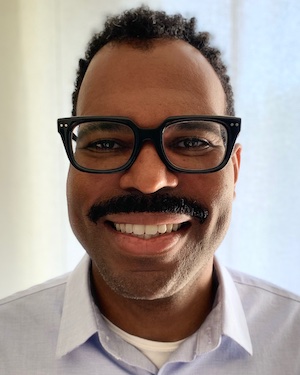
How to go to OT graduate school after being out of school for a long time/Step 4 — Getting letters of recommendation ⟩
January 12, 2022, by Guy
This will be my last blog about how to go to OT graduate school after being out of school for a long time. No matter where you apply, you will need to have letters of recommendation. Knowing how to get letters of recommendation is not only useful for the graduate application process but some of the tips mentioned below can also be applied to other aspects in life. I guarantee that later in life you will need people to serve as a reference for your personality, character, and professional abilities. This will never go away. Trust me on this. At some point, you will need to ask someone that is not your friend or family to vouch for you personally and professionally. Although I put this as the last step, I must emphasize — DO NOT DO THIS LAST. In fact, this is one of the easier things you can start to do once you have decided that you want to go back to OT graduate school after being out of school for a long time.
Like the other steps, what I have written is what worked for me. You may decide to do something different. Remember, do what works for you. You do you!
Whenever I see the words “please submit letters of recommendation” or “provide professional references”, I always get stuck trying to figure out who I should ask. You might feel this way too. For some of you, this might be based on thinking you have no one to ask. For others, you might have an idea of who to ask but are unsure of what they might say. For almost everyone, there is the problem that once you do have an idea who to ask, you don’t know how or when to ask. All are very important concerns that you will need to figure out on your own, or with a trusted friend or mentor prior to asking someone to write a recommendation for you.
For those of you who think you don’t have anyone that can write a recommendation for you because you don’t know anyone other than your family and friends, or are an introvert or feel that you don’t think anyone would want to vouch for you as a future occupational therapist, let me stop you right there. Remember, you’ve already done this process before. You wouldn’t be here if you hadn’t. You did it to get into college. You’ve done it to apply for jobs, perhaps to rent an apartment, or even to adopt an animal. All have required you to get someone that is not your family or friend to vouch for you as a person. Applying to graduate school is no different. In fact, some of those people you used for recommendations in the past might work for this situation too. You may be thinking, “Ok, but I’ve never been an occupational therapist before, so what can they possibly say to vouch for me to be an OT grad student?” Remember, admissions departments are trying to determine whether the program will benefit you and if you will benefit from the program. It’s important for them to find out why you are passionate about occupational therapy, what type of work ethic you have, and if you are an empathetic and caring person. Hearing from people who know you can help them answer these questions. What I did was I made a list of people who might be able to answer these questions. Remember we have been adulting for a while so there are probably a lot of people we know who would be happy to recommend you. People I thought of included a former supervisor, former colleagues, a pastor, a mentor, a fellow volunteer at a community service project I had done, and people in my prior career network. You are bound to come up with at least one or two people when you think back over the past 5/10/15 or even 20 years post-college.
If you still can’t think of anyone, you will be meeting a lot of people as you take classes and volunteer in preparation for meeting the graduate application requirements. In both areas, you will interact with people who will want to learn about your reasons for changing careers and wanting to be an occupational therapist. People will want to know you. If you haven’t already, allow these people to get to know you. Go out for a coffee with them, talk to them about your future, get their feedback on things you’re encountering or questions you have. As difficult as it might be, especially for us introverts, do all you can to make yourself known. I know this is hard. But don’t’ forget it is so much easier for people to write a recommendation for you if they know you. While I was initially reluctant to get to know new people, I got to know one of my community college instructors who showed genuine interest in me. I put myself out there by going to office hours and having meaningful conversations with them about my future professional goals. Even though I only knew them for about a year, when I thought about who I should get to write a recommendation they were one of the first people I felt confident would be able to speak to my character and abilities as it related to going to graduate school in occupational therapy.
Now, for those of you who have a list of people to ask but are unsure of what they might say about you. Here are some questions I used to determine if they were the right person to ask for a recommendation:
- How do I know them?
- Have they known me a long time? Do they know me well?
- When was the last time I spoke to them? What was the conversation? Did it end on a positive note?
- Have they ever shown any interest in my professional goals, interests, or life pursuits?
- Have they privately and/or publicly given me positive or negative feedback about my character, or professional skills?
- Have I ever read anything they have written? Was the writing clear?
- What do they think about my change in career? Are they supportive or shocked?
- Will their recommendation/perspective complement the other recommendations?
Once you have decided who to ask, do not wait. People need a lot of time to write a recommendation. If you can give them at least a month that would be great. Start by calling them or meeting with them in person. If you can’t speak to them directly leave a message and then follow up with an email. My conversations were easy because I had already been speaking to many people about going back to school. But if you haven’t talked to the person for a long time, start your discussion by catching up with them, and then once you start talking about what you are currently up to just say: “Hey, you know how I used to talk about going back to graduate school in occupational therapy, well I actually am starting to apply to schools now and I was wondering if you would be willing to write a letter of recommendation for me?”
To this day whenever I have asked for a reference or letter of recommendation, no one has refused. However, if someone does tell you they can’t write a recommendation, accept it and move on to the next person. Most likely the reason will be due to time. (This often happens when you ask professors who are maybe already writing a lot of recommendations while also trying to grade midterms or finals.) If they do agree to write a letter, make sure to send a follow-up email with simple instructions on what they need to do as well as a clearly indicated deadline. One week prior to the deadline check in with them if they have not submitted the recommendation. Once they have submitted the recommendation, make sure to send them a very sincere thank you email or better yet a card via snail mail! Finally, regardless of whether you get into graduate school or not, don’t forget to contact them after you find out. If you get into the school of your choice thank them again for their help and let them know your next steps. Also, if you didn’t get into graduate school, thank them again for their help and let them know your next steps. People like to know what happened!
Oh, one other response you might encounter when asking people to write a recommendation is the person you ask might ask you to write the recommendation for them. I always find this to be odd. While it cuts out the mystery of what they will say, it also means they really don’t know you or have very little to write about you. Either way they are not really recommending you but are signing off on you recommending yourself. Which is strange. I don’t do this but know people who have . . .
FYI — For my application, I ended up asking three very important people in my life. I asked a former pastor of mine who I had known for many years and helped him to do volunteer projects. I asked a former supervisor, who I had known for years. It’s funny because I just had a long phone call with her the other day. I also asked a person I met during my journey going back to school, the amazing occupational therapist I spent many hours observing while volunteering at an inpatient rehab. However, I had a list of about 6 people who I felt comfortable asking to give me recommendations or references. I keep in touch with them and am so grateful for their support.
I hope you have cultivated similar relationships with sincere and kind people who are supportive of your professional development and willing to say how amazing you would be as a graduate student and an occupational therapist. If this hasn’t happened get started today by reaching out to people from your past or starting new relationships if you can. As you continue to figure out how to go to OT graduate school, I hope that this blog entry as well as the ones I wrote before were helpful. I wish you the best of luck getting back into school after a long time. Remember it’s never too late to start something new!
⋯
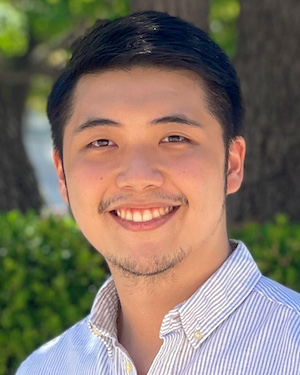
TwentyTwenty-ONE: The Ambassador Year Round-Up ⟩
December 31, 2021, by Marvyn
Diversity Life Hacks What are OS/OT?
Happy DAY ONE (and sadly last) day of Blog-mas! It has been such a blast reading everyone’s blog entries over the past 2 weeks. I hope that this Blog-mas helped you in any shape or form during the holidays! But if you come across this blog at a random point in time in the future, welcome!
For the last blog post of 2021, I decided to round up all the current ambassadors to create this collaboration blog! Call it “The Avengers” of blogs if you will. Crossover blog of the year! While I don’t get carried away, I asked each ambassador the following questions: “What have you learned in life from 2021?” and “What is your TOP GOAL for 2022?” Let’s see everyone’s responses!
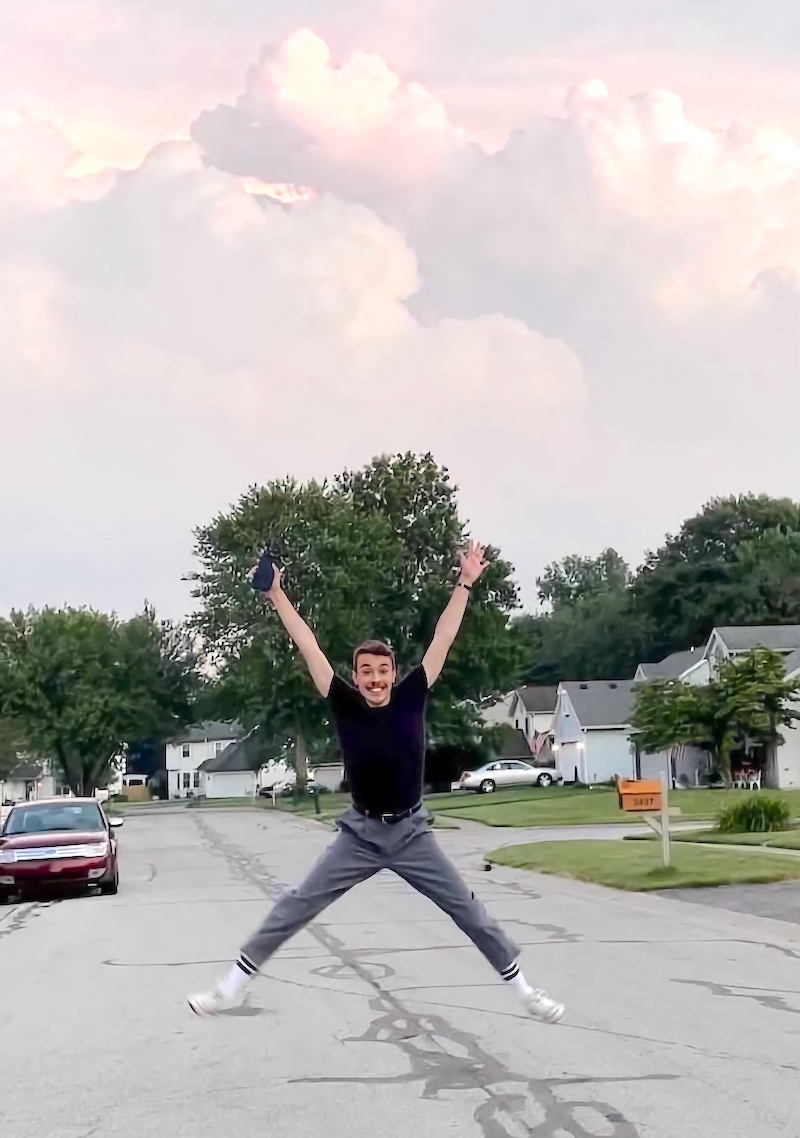
SETH: “As I look back on 2021 what I’ve learned is that no matter how much you grow and transplant yourself, you always have your roots. Up until this past year, I couldn’t wait to get out of my hometown and escape to the big LA city, but after a couple of months of quarantine, I really began to discover a newfound and indescribable appreciation for the place and people that raised me. When we slowly began to transition back to in-person classes I realized how much I missed the peace and quiet, the dinners with my family, and the pace of life. After five years, I felt like, for the first time, I had feet firmly planted in both places. At a point in my life where I am figuring out the next steps, it is nice to know that I have it in me to be adaptable, but also that I have a place that fits the stereotype of a home is where the heart is.
As I look forward to 2022 my top goal is to spend more time doing the things that mean the most to me and to find more small moments of joy throughout my day. It is easy to fall into a slump or get busy or to focus on what might not be going as planned, but being able to feel those things, quickly shift perspective, and take action is a philosophy that I’d like to more seriously put into practice. I always come around eventually, but by being more mindful, more present, and more intentional I believe I could enrich my 2022 experience. Big things are on the horizon and I want to give them, and myself, the love and attention they deserve! Here’s to the new year and new habits, roles, and routines!”

KAYLA: “While this year has taught me a lot, more than anything I learned how to enjoy the journey. When faced with difficult situations I am always anticipating something going wrong, and pre-stressing about fixing problems. This year I really tried to change my thinking from “what if it goes wrong” to embrace the ideology of “what if it goes right”. This subtle change has helped me be more present for the huge changes happening in my life, allowed me to be more mindful, and have the capacity to enjoy my experiences in the moment rather than having to reflect on them later down the line.
During this next year I want to be really intentional with what I do and how I spend my time. I am a self-proclaimed “sleepy girl” and will choose sleep over anything 9 times out of 10. In 2022, I want to take advantage of more opportunities to step outside of my comfort zone. I want to go new places, try new things, and have new experiences all 2022!”
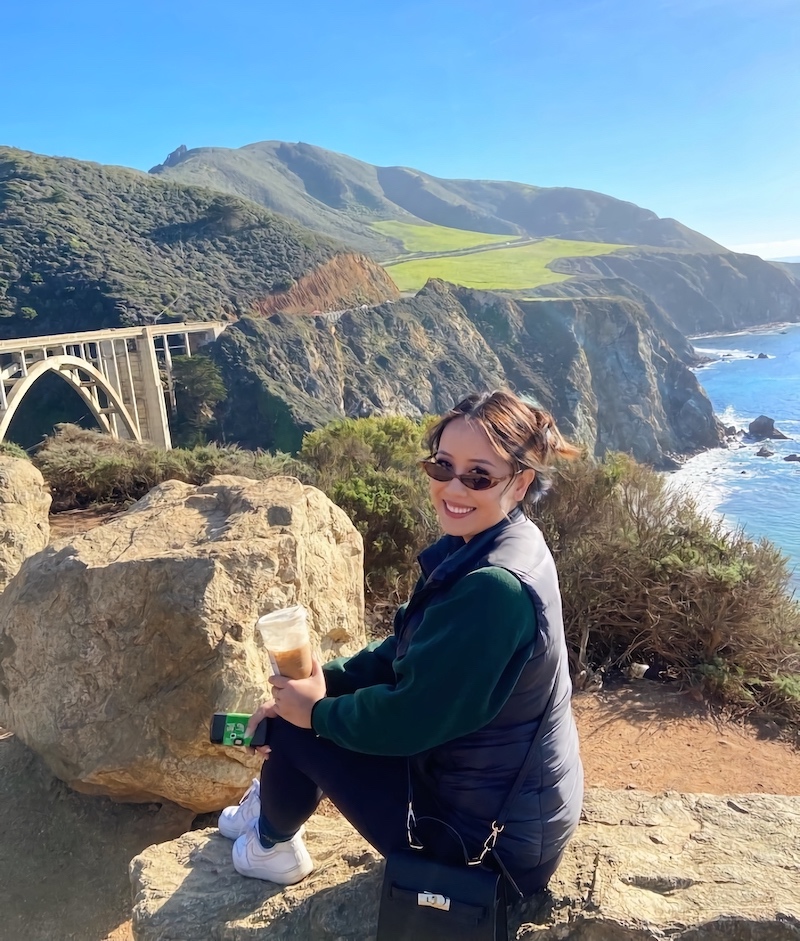
TERESA: “Looking back, I accomplished each goal I set for myself in 2021, which is not something I’ve been able to say in a while. I think this was due in part to my primary goal for the year, which was to accept that so many things in life are out of my control and to learn to be okay with that. However, I can be in control of the way I act and react to situations. With this approach, it allowed me to tackle goals which were internally motivated but contingent on an external source and completely out of my control.
In 2022, my only resolution is to show more self-compassion and for some reason, that seems more daunting a task than prior years. I am my own worst critic because I always thought if you’re self-aware of every single one of your flaws, then no one else can use them against you . . . right? Except in 2021, I realized that I tend to use them against myself. As a student and future OT, I’m always reminding myself that I can’t pour from an empty cup but I also need to remember that outside of those roles, I am also human. As a human, I’m inevitably going to mess up but despite these mistakes, the person I need forgiveness and validation from most is myself. Also, the members of BTS said to “Love Yourself” so, in 2022, I will be. I’m going to accept love from the world, from those I love, from myself, and return that love tenfold.”

SILVIA: There’s more to life than ___.
For a long time, my life has revolved around school and family, two very important things to me. From wanting to perform at the top of my class to trying to mediate family tensions, these two aspects of my life have also brought the most stress and anxiety. This year, I have found myself sitting in the ugly and telling myself, “There has got to be more to life than this.” “This” stands for the feelings, the worries, the distress — everything that is making me unhappy at that given moment. This reminder has allowed me to sit, feel, and embrace my emotions . . . and then let them go so that I too can keep going.
Top Goal for 2022: Learn to Adult.
Some may say that I entered adulthood a couple years ago, but that is fake news. Truth is, I am turning 26 this year (next month actually) and that means going through the rite of passage that marks my transition into adulthood: getting kicked off my parents’ health insurance. In light of this, I have made a list of “important things I must learn to do as an adult.”
1. Learn to budget. Shoutout to Kimberly Kho for sharing some of her tips and tricks with me—the Mint App will be my best friend in 2022.
2. Learn to do my own taxes. I’ve heard TurboTax can help me get the job done, but I have a feeling that my father will sit me down for a 3-hour explanation instead.
3. Figure out my health insurance situation. Bless the student health insurance, for now. After graduation, I have a feeling I will be listening to another 3-hour explanation from my father on how to do this.”

ALYSSA: “In the spirit of blogmas lists, here’s my list of what I learned in 2021: (1) I’m a podcast person now. (2) There’s more to life than the coasts! I’ve flown between NJ and CA so many times and this summer I had the opportunity to explore in between via road trip from Chicago back to LA. 10/10 recommend. (3) Living with your best friends is the best way to live.
My goal for 2022 is to enjoy exercising at home. I felt like I missed my window to get #fit with at-home workouts in 2020 but who’s to say where the pandemic is headed in 2022, so . . . time to sweat!”
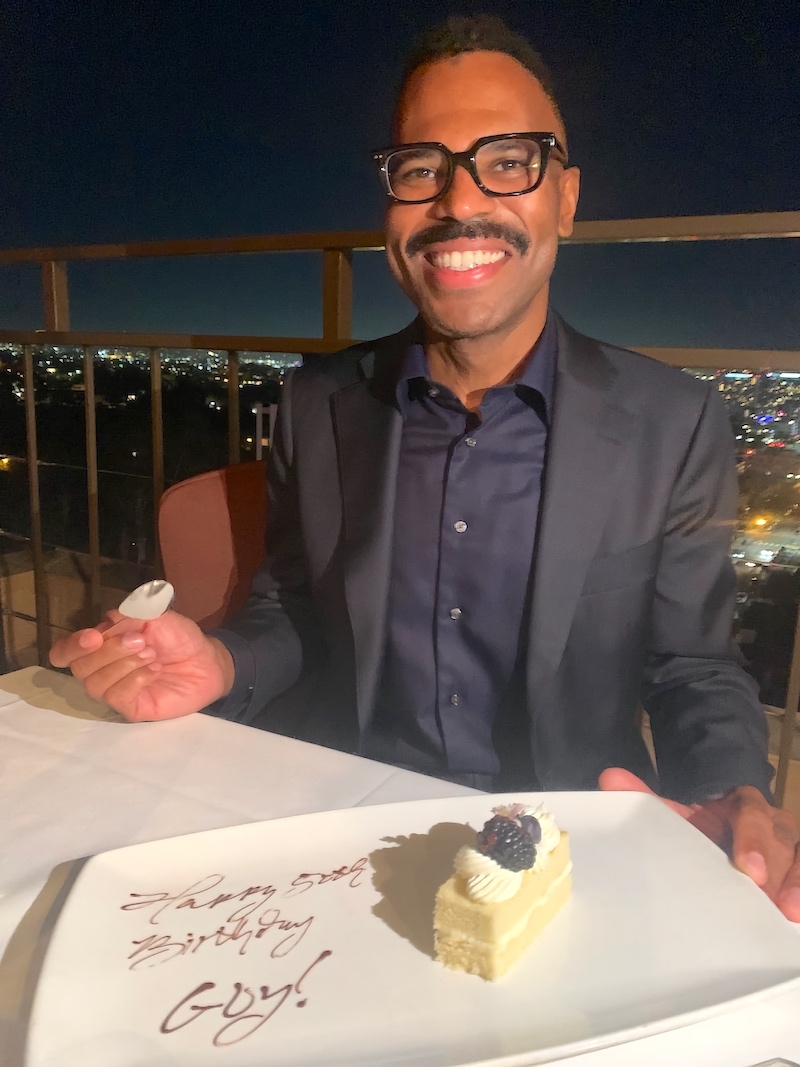
GUY: “This past year I learned to cherish those close relationships I hold dear in my life. Life is short! My top goal for 2022 is to continue to spend more time with my lifelong friends celebrating and enjoying life like I did on my birthday this past year.”

MARVYN: “And as for me, 2021 has been a roller coaster of a ride. Looking back, I realized that I have achieved a lot of the goals I set for myself. I was able to pause my life as a practicing occupational therapist back at home to pursue my Master’s degree here at USC. I was able to step out of the box (mainly because of quarantine and lockdowns back in 2020), and I pushed the boundaries of my comfort zones coming here as an international student. I have become more independent than I ever was, and I became more confident in myself and my capabilities as a person and as a professional. 2021 has been such a teacher for me, in such a way that even though you are miles away from your family, I am in such a great, and importantly very safe, environment to achieve my goals in life. I am overwhelmed with pride and humility at the same time because I didn’t expect to be who I have become today. If “2020 Marvyn” saw me today as he starts his 2021, he would be in disbelief at the sheer amount of growth he has had over one year.
2022 is a promising, yet daunting year for my life. I am slated to graduate with my Master’s degree this year and that my professional life will be catapulted swiftly into the real world. If there’s anything I want to look back on by the end of 2022, it is that I want to become a licensed and practicing occupational therapist here in the USA. No matter what hurdles may come my way, I do hope Destiny and Fate agree with my goals and guide me through the right paths. I am so excited at the same time nervous for what’s to come, but I hope 2022 would be my best friend much like how 2021 was to me.
SIDENOTE: I want to take more pictures around LA too (and that’s just a side quest I’m also looking forward to doing very soon)!”
And that’s a wrap! Thank you all for a wonderful 2021 and for reading our fun series of blogs over the past few days. New Years is tomorrow, and we here at the student ambassador team are so excited to greet 2022 with you.
⋯
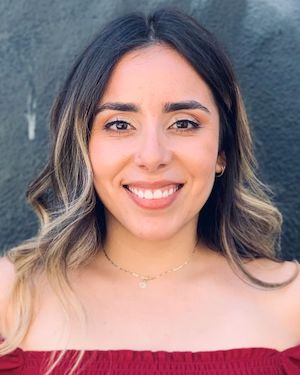
MA-2, Year 2 ⟩
December 30, 2021, by Silvia
Classes Living in LA What are OS/OT?
2022 is around the corner and so is the end of my time as a student in the Entry-level Master’s program. It is bittersweet to think that just in a couple of months I will be graduating with a master’s degree in occupational therapy and on my way to my second level-2 fieldwork, before prepping for/taking the NBCOT exam and hopefully becoming an *official* OT.
— Woah. Woah. Woah —
Let’s take it back because that still feels very much unreal. Time truly flies by when you’re having fun . . . and when you’re not, tbh. But anyway, I would like this blog to focus on the now, and that is entering my second semester of year 2 of grad school. Like many of us often do with a new year though, I first want to reflect on what last semester was like before sharing what I hope for and look forward to in the upcoming one.
Year 2, Semester 1 (Fall 2021)
Last semester tried me, and it almost won. But it didn’t.
You know when you start a new routine and things feel off, but you tell yourself you just have to get into the swing of things, and eventually, you’ll get your mojo back? Well, that’s exactly what the entire Fall 2021 semester felt like, except I never got into the swing of things, nor did I get my mojo back. Was it the classes or the switch to being fully in-person? Idk, but we pulled through and in the process realizations and reevaluations were made. Here are the 2 that stand out to me:
- A marker of last semester was applying to the OTD program. This was an interesting time because as I was completing the application, which meant staying one more year for another degree, I was complaining about how I had no more school left in me. So, why was I doing that to myself? I came to the realization that I was on “student autopilot” mode and needed to turn it off to figure out what it was that I truly wanted. I am not sure that I completely know yet, but I realize that I don’t have to keep going to prove myself to anyone (including myself).
- Priorities — I spent a lot of time reevaluating these. Before even starting this program, I remember telling my boyfriend that when I’m in school, school is my #1 priority and everything else comes after, but that is definitely not true today. Understanding the importance of meaningful occupations and their impact on my mental health has helped me shift my priorities around. Last semester I spent less time worrying about school and more time loving on my family, spending quality time with friends, and focusing on my physical health.
Though I felt lost most of last semester, I think I actually found myself.
Year 2, Semester 2 (Spring 2022)
We’re ringing in the new year and new semester with a remote start. Back to Zoom we go, but I am not mad about it. Fingers crossed that it is only temporary! I have a good feeling about the Spring 2022 semester, and I am looking forward to 2 things in particular: electives and spending more time with friends before we part our ways after graduation.
- Did you know that the electives are graded CREDIT/NO CREDIT? I didn’t. But now that I do, it is a game-changer. The semester hasn’t even started, but I am already not stressed. *Knock on wood and fingers crossed this stays the same* Also, this semester we are no longer taking classes as cohorts, which means I get to mingle with the rest of our class :’). I am most excited about the pediatric-based courses that I will be taking because that is the area of practice that I am interested in. I’ll be taking OT 567 (Contemporary Issues: Occupational Therapy in Early Intervention), OT 575 (Dysphasia Across the Lifespan: Pediatrics Through Geriatrics), and OT 578 (Therapeutic Communication: Facilitating Change in Clients) — I will let you all know how it goes!
- One of my meaningful occupations is spending time with friends. From study dates to Friendsgiving dinners, I cherish all the memories made. This upcoming semester it is important for me to spend quality time with friends because before we know it, we will be taking different paths — we’ll be at different fieldwork sites, some will be going onto the doctoral program, others will be moving back home, etc. The point is, I want to make the most of next semester with my friends and future colleagues. ❤️
And like that, in the blink of an eye, two years will have flown by.
⋯
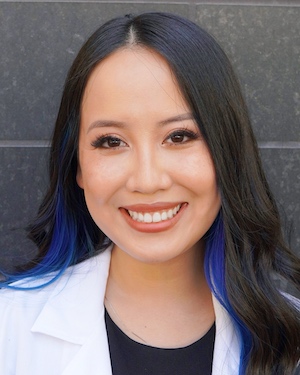
ABC and 1, 2, Three ⟩
December 29, 2021, by Teresa
With the way the Master’s program is set up, there are 3 practice immersions, which is an 8-unit course you take each semester that focuses on a primary area of practice in occupational therapy. The focuses are on adult physical rehabilitation, mental health, and pediatrics. (For the entry-level OTD, there will be an additional practice immersion focused on productive aging and geriatrics!) My entire class is split up into 3 different cohorts of about 40 students and each cohort takes these practice immersions in a different order. I’m in Cohort C, meaning I started the program last year taking pediatrics, adult rehab last spring, and just recently finished mental health this fall. In honor of the third to last day of Blog-mas, I’ll be sharing 3 main takeaways I learned during each of the 3 practice immersions!
Pediatrics
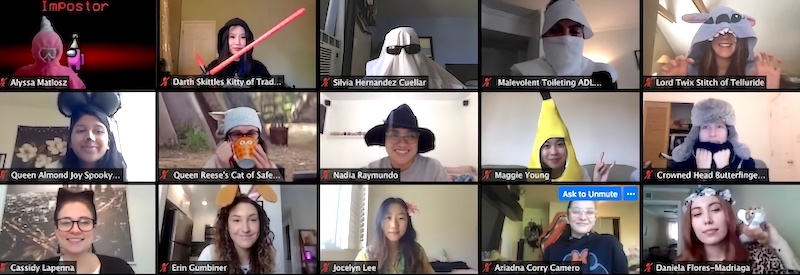
Fall 2020 feels like a fever dream. I miss it, though. *sigh*
- In this immersion, we were introduced to the infamous documentation process. We learned how to take SOAP notes as well as the importance of documentation. Being an OT is not just delivering services to a client — you have to take notes on what you did so you can remember, so that other providers can reference them, and so that you are properly compensated for your services!
- We also learned about how your “client” not only includes the one person you directly provide OT services to, but also encompasses their family and/or support system. It’s important that you include the appropriate people as part of treatment, because they can offer pieces of information which will be vital during the treatment process!
- One of my biggest hesitations about working with children was not being able to speak with them verbally in order to elicit what their needs are. However, we learned about signs and methods of nonverbal communication, many of which apply to adults as well!
Adult Physical Rehabilitation
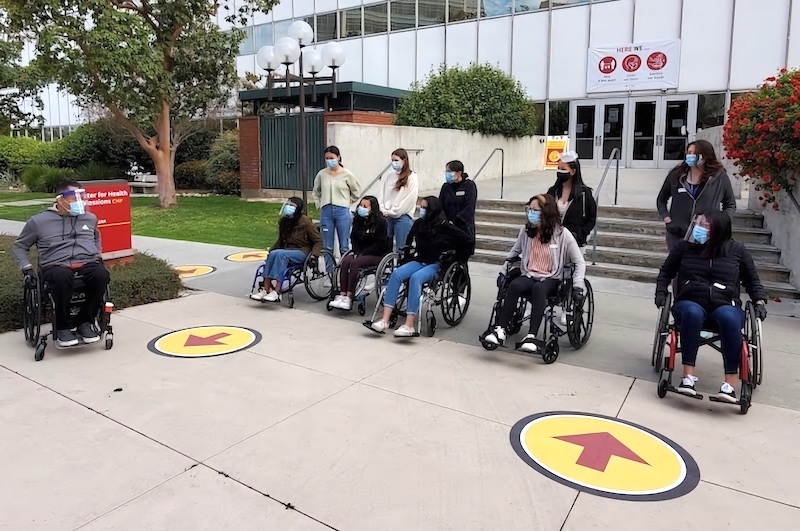
Getting to go on campus once a week for hands-on practice immersion labs and meet my classmates in person during Spring 2021 was such an exciting time!
- In this immersion, we learned about the evaluation process in further detail and how important it is to establish a baseline during your first encounter with a client because it will determine what the rest of their treatment looks like. However, with OT being such a holistic profession, there are so many things you’ll want to know about your client from the start! This immersion is scaffolded so wonderfully and in harmony with the fieldwork experiences that by the end of the semester, you become comfortable with this process!
- Almost every class, we’d hear that the most important thing to remember when working in an adult rehab setting is to “meet people where they’re at” — both physically and mentally. If your client is unable to stand, meet them where they’re at and have a seat yourself — don’t physically talk down to them. Additionally, your clients are the experts of their own lives and the last thing you want to do is have them overexert themselves, so make sure your interventions match their capacities and goals!
- In keeping with that, never assume someone’s capability, identity, or thoughts. Foster an open space to nurture and maintain the therapeutic relationship between you and your client. For example, USC provides us with name badges that include our pronouns (mine are she/her/hers) and the presence of this alone has sparked many important conversations during my fieldwork experiences. Again, they are the experts of their own lives, so check in with them often to make sure their needs are being met.
Mental Health
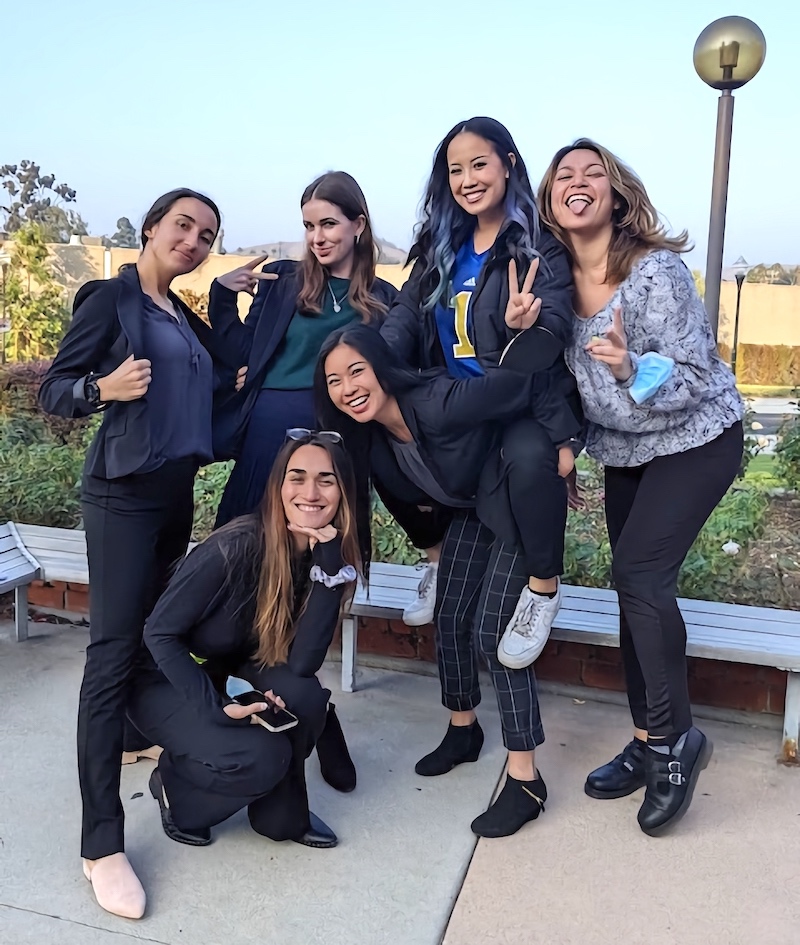
The best Team-Based Learning group to ever exist! Gimme, gimme MORS, gimme MORS, gimme, gimme MORS 😢
- In this immersion, we learned how important it is as entry-level OTs to use standardized assessments correctly as we garner experience and continue to develop our clinical identity. These assessments are founded on evidence-based practice and were developed and researched with a clear purpose in mind to guide the treatment process in a way that is proven to work!
- In certain areas of OT practice, there is also a need for providers to “do whatever it takes” in order to facilitate your client’s recovery which may extend beyond traditional care. While this may sound intimidating, it aligns with the holistic approach of occupational therapy in that it emphasizes how each individual requires unique, individual needs and requires providers to immerse themselves in the process in order to meet these needs.
- Maybe it was because this was our first semester fully in-person, but I was able to truly understand the importance of teamwork within any group setting — from the classmates you sit next to every day, to your cohort, to your entire graduating class, as well as the teams you’ll go on to be a part of as an OT. For any given topic, everyone in a team will offer a different perspective which you might not have picked up on because you, yourself have a different perspective based on who you are as a person and not that any perspective is the right or wrong one, but the collaboration offers a space for boundless solutions.
To end Day 3, I’d also like to feature the 3 cohorts of the Entry-Level Master’s program class of 2022! Cheers to everything you’ve all accomplished in 2021 and here’s to all the memories to be made during our last semester together!
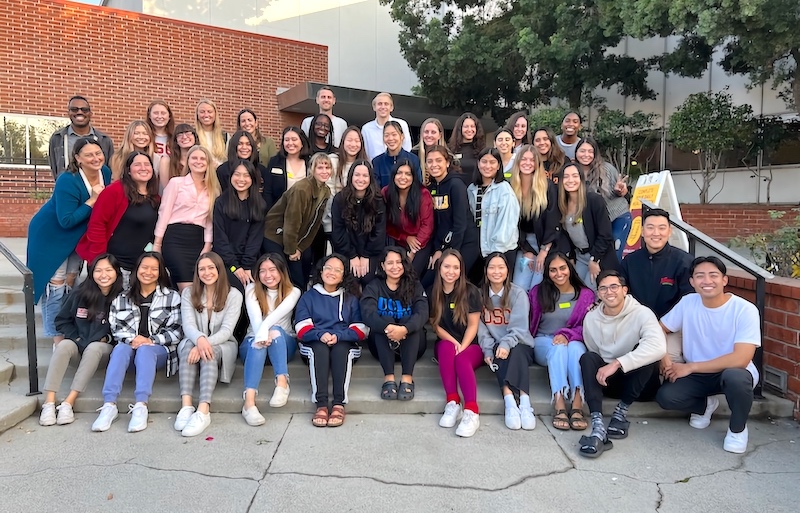
Cohort A (Photo courtesy of Earl Sy)
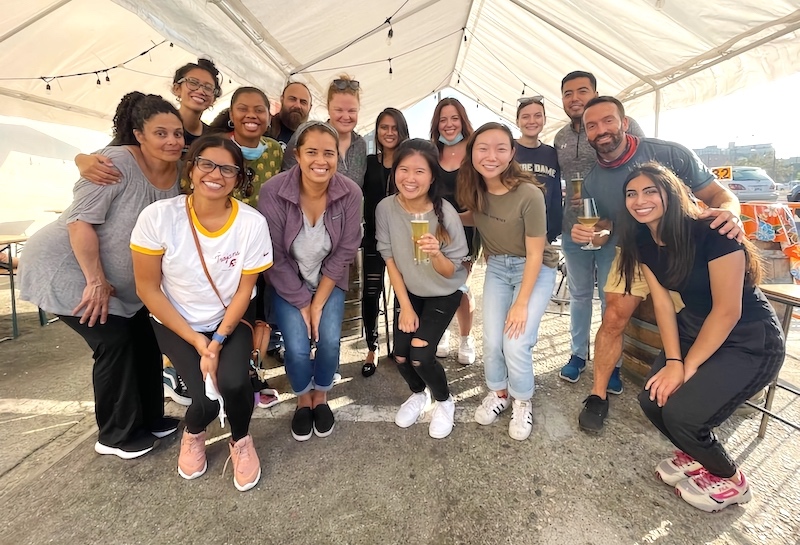
Some of Cohort B (Photo courtesy of Stefanie Kuizon)
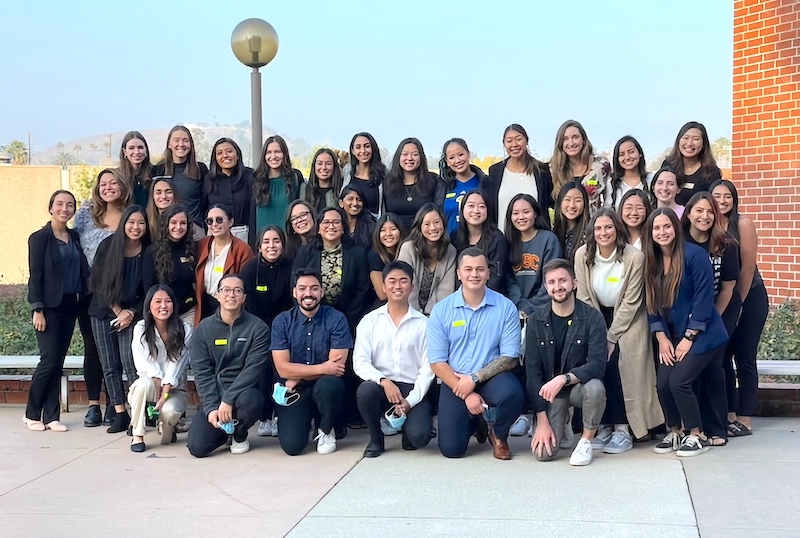
Cohort C (Photo courtesy of Camille Hazen)
I cannot wait to see you all become some of the best occupational therapists this profession has ever seen. ❤️
⋯





